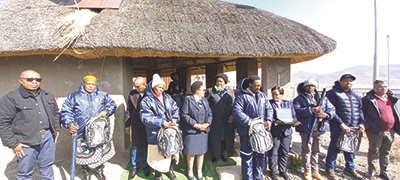By:Thoboloko Ntšonyane
MOKHOTLONG – The Lesotho Highlands Development Authority (LHDA) has extended a helping hand towards the welfare of the village health workers (VWHs).
LHDA donated essential health equipment to the Ministry of Health (MoH) for the VHWs.
The donations include 20 laptops for health the facilities, 12 tablets for village health workers coordinators, 500 freezer suits, 500 backpacks, and 500 umbrellas all for VHWs running north worth M2.6 million.
These developments unfolded last week at Tlokoeng, Mokhotlong.
Often operating under challenging weather conditions and with limited resources, these essential equipment is expected to motivate them while also ensuring the improvement of access to primary healthcare in rural communities.
The donations received for village health workers come as a boost for the VHWs who have long toiled to address the healthcare needs of rural communities.
Speaking at the handover ceremony, Polihali Operations Branch Manager Gerard Mokone said the laptops will be used by hospitals and health facilities within the Project area: Mokhotlong and ‘Mamohau Hospitals including Seshote, Katse, St Martins, Mapholaneng, Malubaluba, Libibing, St James and Molikaliko health centres.
Mokone said this support will complement the Ministry’s e-register initiative and enhance efficiency in data management, sharing and analysis of information within the healthcare system “to ensure that patients consistently receive improved quality of care anywhere in the country”.
He said one of the initiatives undertaken by the MoH that the Project is supporting is the outreach programme that promotes access to health services for communities in remote areas. “It comprises improving the health status of mothers, newborns, children, and adolescents who are the most vulnerable groups of the population and who utilise the bulk of health services,” he said.
Mokone said the tablets they gave to village health workers coordinators will help monitor and feed valuable information to the national health information system.
“As per the Mou [Memorandum of Understanding] between LHDA and MoH LHDA further intends to pay stipends after the VHWs verification exercise is complete which will indicate the total number of VHWs to be recruited per Health Centre,” he said.
The beneficiaries will be the VHWs for the three districts affected by the LHDA’s projects which are Mokhotlong, Thaba-Tseka and Leribe.
These stipends the project will pay for a period of two years.
Polihali Operations Branch Manager said their Public Health Action Plan (PHAP) was informed by a Public Health Baseline Study (PHBS) that shed data on prevailing status of the population before commencement of the project.
This study, he said, was followed by the Health Impact Assessment (HIA) study that established that Mokhotlong had a high rate of malnutrition wherein 48 percent of children were stunted and 3.6 percent wasted and that the national average rate was lower at 33 percent and 3 percent.
He highlighted that the HIA study found that 66 percent of the Mokhotlong population was 30 years old; 24 percent were women of reproductive age (15-49 years) and the district had an unintended pregnancy-adolescent birth rate at 24 percent.
“The study further identified potential public health impacts in the Project area such as high HIV and AIDS prevalence rate, Sexually Transmitted Infections (STIs), teenage pregnancy, pressure on social and health amenities, human trafficking, gender-based violence, limited access to clean water and sanitation and psychosocial problems.
“In addition, it provided comprehensive information on the state of health of the communities, their way of life and concerns regarding construction of the Polihali Dam.
He continued: “Our involvement in the environmental and social programmes is guided by the 1986 Treaty signed by the governments of Lesotho and South Africa, Article 15, which articulates that reasonable mitigation measures to protect the quality of the environment and ensure the welfare of people and communities affected by the Project are implemented.”
Sister Refuoe Sehlare, speaking on behalf of the Director of Primary Health, underscored that the primary health services should be rendered in the communities.
“Our VHWs will ensure there is coordination leading to the cure of ailments. They are the ones at the forefront to ensure people come to health centres so that they are tended,” she said.
She further noted that the MoH has the duty to offer antenatal care services to pregnant women.
She said good nutrition starts in communities, adding that people should produce food in their gardens and eat healthy meals.
Sister Sehlare said eating healthy diets before pregnancy improves fertility and the health of the baby.
She said VHWs need to be capacitated in order to raise awareness on issues of HIV and unintended teenage pregnancies, the awareness that will help reduce their rates in the communities.
“If we could join hands, we will have a healthy society,” she said, adding that the intersectoral approach is critical.
“We thank you LHDA for playing a part in improving and ensuring that nutrition, pregnancy and awareness raising efforts reach the adolescents in schools as well as training our healthcare professionals, ” she said.
One of the beneficiaries, a VHW for Tlokoeng, ‘Mabonang Sethati appreciated the LHDA’s gesture saying the essential protection came in handy for them.
Sethati said the essential cold weather protection will enable them to perform their duties even in harsh winter conditions.
“In the past, we could not do our work well due to [unfavourable] weather conditions, we were unable to visit the patients,” she said.


